 Volume 82, Issue 2, April-June 2019
Volume 82, Issue 2, April-June 2019
Judgment at Risk
 Danièle Cohn, Judgment at Risk. Foreword
Danièle Cohn, Judgment at Risk. Foreword
Laurent Jaffro, Moral Judgment and Persistent Disagreement
The aim of this article is to clarify the conditions of real disagreement in the epistemology of moral judgments. It would seem that moral subjectivists can deal with disagreement more easily than realists. The former can refer disagreement to the diversity of individual or social preferences that evaluations express. The latter seem to struggle to account for it in contexts where the informational conditions of an evaluation are met. This paper defends a third approach, attentive to the epistemology of evaluation, which puts the emphasis on how moral value judgments are essentially dependent on reasons. In morality as in other areas, judging is, among other things, assuming responsibility for a verdict that may be justified.
Jean Lassègue, Computable Ambivalence and Crisis of Judgment
This article deals with the digitalization of law which disturbs the exercise of judgment by partially depriving it of its basic prerogatives. It explores the relationship between two types of legitimacy, juridical and digital, by relying on arguments from the history of science: the master argument of Diodorus Cronus, the characteristica universalis of Leibniz, and the theorem of limitation in computability by Turing.
Jean Garapon, The Judicial Judgment Grappling with Other “Forms of Truth”: Market, Computability, and the Digital Age
The market model, risk management, and predictive justice pose unprecedented threats to judicial judgment. As powerful and attractive as they may appear, these new “forms of truth” (Foucault) lack contact with reality, and seem unable to avoid mortal contradictions themselves. That is why connections to the traditional, un-upgradable form of judgment, are to be sought.
Philippe Urfalino, A New Political Decisionism. Philosophy of Leftist Populism
This article examines the political philosophy of Ernesto Laclau and Chantal Mouffe and their argumentation in favor of a left-wing populism. First, it demonstrates that behind their criticism of a naive quest for consensus, supposedly at the core of liberal thought, stands a claim of a political decisionism inspired by Carl Schmitt. It then shows how this decisionism has been reformulated with the help of the notion of undecidability, drawing on Derrida. Finally, the article emphasizes that the presumed undecidability of social concepts and practices leads to a balkanized vision of society and makes the very idea of political judgment impossible.
* * *
Augustin Dumont, Fichte and the Kantian Radical Evil. An Unfinished “Auseinandersetzung”
This paper aims to question the way Fichte reappropriates the Kantian theme of radical evil. It is generally accepted that only Schelling strives to inherit such a theme, even though the concept of evil is designed to fit into a very specific ontological framework. I try to show that, far from going back to the “philanthropism” of the Enlightenment, Fichte takes the enigma of radical evil very seriously. To this end, the paper offers a careful reading of § 16 of the Sittenlehre. I demonstrate that the core of our capacity to commit evil lies in the inner conviction that the law of autonomy is nothing more than the subject’s own will. I show that it is the subject’s free choice to believe so.
Gilbert Gérard, Substantiality and Causality. The Evolution of the Hegelian Reading of Spinoza
This article aims to show how the transformation in Hegel’s evaluation of Spinoza between his earliest writings in Jena, which were entirely favorable to the Dutch philosopher, and his mature texts, in which his judgment of the latter is decidedly more critical, corresponds to a profound modification in his system. This modification is that which leads from a metaphysics of substance essentially in conformity with the ontological tradition, to a metaphysics of actuality (Wirklichkeit) and of act resulting from a critical relationship to this tradition. It is considered here by means of an examination of the way in which the relationship between substantiality and causality evolves in Hegel’s thought.
Pierre Steiner, Wittgenstein: From Action to Expression. Mental Phenomena and Cognitive Science
Some recent philosophical positions in cognitive science, such as enactivism, do not fall prey to the objections that have long been addressed to classical cognitive science based on a certain reading of Wittgenstein. However, a close re-examination of Wittgenstein’s remarks about the myth of mental processes and about the use of psychological concepts shows that enactivism and classical cognitive science share basic presuppositions. The importance of the Wittgensteinian concept of “expression” is then presented, so that it allows one to consider the relations between mental life and behavior. This concept remains compatible with a scientific study of cognition.
Luciano Gatti, How to Write? Essay and Experience after Adorno
This article discusses Theodor W. Adorno’s “The essay as form.” In order to emphasize the objective character of the intellectual exercise configured in the essay, this article extends Adorno’s approach to the concepts of experience, ideology, and critique. In this context, it resumes Adorno’s dialogue with authors such as Montaigne, Hegel, Proust, Lukács and Benjamin, and discusses the conditions of essayism in Brazil.
